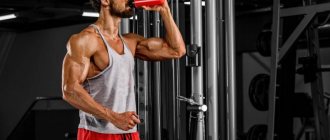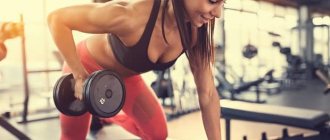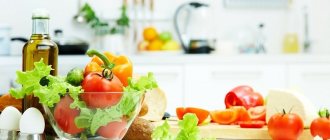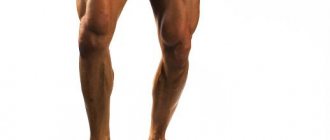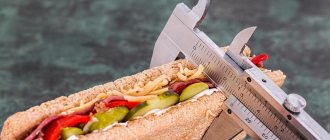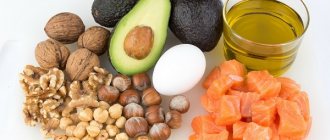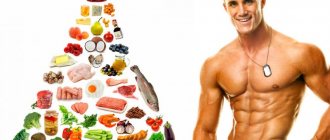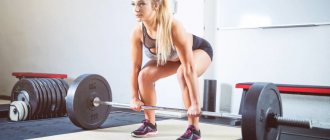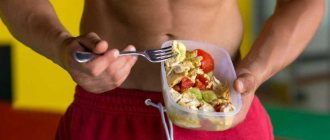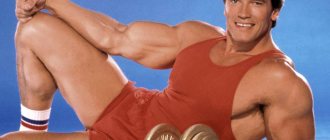Basic Rules
The diet should be organized so that nutrients are supplied evenly throughout the day, so introducing three meals a day is a bad idea. Divide your daily calorie intake into 5-6 meals. There should be intervals of 3-4 hours between them. This is not the only important rule, there are others:
- Drink plenty of clean water. To gain muscle mass, you need at least 2.5 liters of water per day, because without fluid, many physiological processes necessary for muscle growth will occur slowly.
- The daily amount of calories for an adult athlete is from 3 to 4 thousand. At the same time, high-calorie foods should account for no more than 70% of the daily requirement, the rest should be nutrient-rich non-calorie foods like fruits and vegetables.
- Maintain a balance of proteins, fats and carbohydrates in your diet. The daily intake of carbohydrates is 50-60% of the diet, proteins – 30-35%, fats – 10-15%.
- Do not exceed the recommended dose of fats; give preference to vegetable fats. Completely exclude margarine, lard, smoked meats and sausages from the menu.
- Avoid fried and baked foods. Use gentle cooking methods: boiling, stewing, steaming. Vegetables are best eaten raw.
- Consume the main part of the daily menu before 17:00. Two hours before training - a portion of proteins and carbohydrates necessary to nourish the muscles. After training - sports shakes with protein, vitamins and minerals.
- Eat healthy foods with a high glycemic index within 3-4 hours after exercise to recover from exercise and replenish muscle glycogen stores. Although sweets and buns are high in calories, save them for exceptional occasions.
- Don't expect quick results. Normal weight gain is 600-800 grams per week. If you gain weight faster, this is a reason for concern, not joy: not only muscles are growing, but also fat tissue.
Principles of nutrition
It is known that weightlifters need a lot of protein to sculpt their body. Beginners, carried away by protein shakes, forget about micro- and macroelements, vitamins, amino acids, antioxidants, which are necessary for the normal functioning of the human body, regardless of his attitude to sports.
The best option to get this whole “healthy set” is to eat natural foods:
- meat;
- fish;
- vegetables;
- fruits;
- cereals;
- sour milk.
Successful nutrition for a bodybuilder is based on the following “three pillars”:
- A good appetite.
- Balanced menu.
- Strict eating regimen.
An effective gain of lean muscle mass occurs with an increased caloric intake. At the same time, the source of additional calories and the time when to eat them are important so that the gain does not come from fat deposits.
Reception frequency
It is common practice to eat three times a day. But this routine is not suitable for bodybuilders. Strenuous strength training requires a lot of energy, which will not be enough if more than three hours pass between breakfast, lunch and dinner. The muscles do not receive nutrition and stop growing, and this negates the efforts expended in the gym.
Thus, to build muscle mass, meals should be evenly distributed throughout the day, taking into account the interval between them no more than 3 hours.
It turns out that you need to eat (including small snacks) 5-6 times a day to ensure the uninterrupted formation of muscle tissue.
The optimal regime for gaining weight is to give the body an hour or two to digest, and then go to the gym. After the load, give the body 30-40 minutes to recover, and then eat something.
Calorie content of food
When food is processed in the body, energy is released, measured in calories, which is spent on maintaining vital functions, including building tissue. Effective muscle building occurs when the number of calories delivered with food exceeds their daily consumption.
The required amount of calories for a pumping athlete depends on his:
- individual basal metabolism, which is affected by weight, age and height;
- level of daily physical activity;
- body type.
The calculation is carried out in three stages:
- The total amount of energy required for life.
Men can calculate their indicators using the formula:
10 x B + 6.25 x R – 5 x L + 5, where
- B – weight in kilograms;
- P – height in centimeters;
- L – number of years lived.
- Calories needed to maintain current weight.
Special coefficients are used that reflect the daily load level:
- 1,275 – up to 3 workouts per week;
- 1,55 – 3-5;
- 1,725 – 5-7;
- 1.9 – more than 2 per day.
The value obtained in the first paragraph is multiplied by the corresponding coefficient.
- The number of calories an athlete needs to consume to gain weight.
The inherent ability of nature to gain weight quickly or slowly is taken into account by adding 15% or 20% to the figure obtained in step 2. So:
- those with a predisposition to be overweight (endomorphs) add 15%, as their weight grows quickly;
- thin men (ectomorphs) gain 20% as their weight increases slowly.
As a result of the calculations, a value is obtained that helps to build a nutrition program and, based on calorie indicators, select products for gaining muscle mass.
Proteins, fats and carbohydrates
Weightlifters who begin to master the rules of sports nutrition often make the mistake of giving preference to foods high in protein rather than including fats and carbohydrates in their diet.
In the body of an actively engaged athlete, when building muscle structure, complex hormonal processes take place that are impossible without fats. And without carbohydrates, you will not have the strength to withstand increased loads.
Only a balanced menu, including the required ratio of nutrients, allows you to build an effective diet for gaining muscle mass for men in order to achieve noticeable results in a short time.
This menu should contain:
- 30-35% proteins;
- 10-20% fat;
- 50-60% carbohydrates.
The averages given provide a range for individual adjustments based on body type, body type, and goals.
Water
Compliance with the drinking regime is an important component of protein nutrition.
For effective mass gain, you need to consume from 2 to 4 liters per day, depending on the weight of the athlete. You need to drink between meals. You should not wash down your food, so as not to disrupt the physiological processes of digestion that facilitate the absorption of nutrients.
Body types
Some athletes build muscle more easily, while others find it more difficult. Someone can train for years, lifting weights for breakfast, lunch and dinner, but will remain thin, without a hint of relief, while someone went to the gym for a couple of months - and already flaunts perfect abs. It depends on your body type. It affects the training plan and choice of products for gaining muscle mass in girls and men. Therefore, before creating a diet, it is important to determine your body type.
The hardest thing is for ectomorphs. People of this physique are excellent athletes and climbers: they are naturally lean, energetic, and agile. They have a fast metabolism, so an ectomorph can gain weight only due to serious health problems. But it is not easy for such an athlete to build muscle, so they are recommended to consume proteins before and after training.
If you belong to this category of athletes, do not be discouraged: yes, you need to balance your diet so that you get a lot of proteins, and the results will not come quickly. But when it appears, you will look great. The lack of fat and narrow bones allow you to achieve a very beautiful muscle definition.
The direct opposite of an ectomorph is an endomorph. If you have a hard time losing weight but gaining it back easily, have a naturally powerful build and solid, slow movements, you most likely have this body type. The good thing is that you are gaining muscle mass quickly. The bad thing is that it is not visible behind the adipose tissue. Endomorphs should train to burn as much fat as possible. If this is your case, after training, do not under any circumstances eat flour, fatty or unhealthy foods. You should keep your consumption of such foods to a minimum.
Mesomorphs achieve brilliant results in the gym the fastest. These are men of athletic build, with developed muscles, but without a tendency to be overweight. They do not need to put as much effort into increasing muscle mass as ectomorphs, but they also do not need to limit themselves in food, like endomorphs. Mesomorphs can afford greater freedom when choosing a training and nutrition program for gaining muscle mass in women and men.
Find out your macronutrient requirements
Macronutrients are proteins, fats and carbohydrates that are needed in large quantities every day to maintain life. The number of grams of each macronutrient depends directly on your individual caloric needs for muscle building. On a 3,200 calorie per day diet, try to consume:
- A minimum of 2 grams of protein per kg of body weight per day = a minimum of 154 grams of protein if you weigh 77 kg.
- About 45% of your calories should come from carbohydrates = 360 grams.
- Approximately 25% of calories should come from fat = 89 grams.
- About 30% of calories should be protein = 240 grams.
Your individual calorie and macronutrient needs depend on your current weight, goal weight, and activity level. However, you can easily take this diagram as a basis when drawing up a nutrition plan.
Calorie content of food
To lose weight, you need to burn more calories than you take in. To grow muscles, you should follow the opposite principle, but do it in such a way that excess calories go into muscles and not into fat tissue. There are different ways to calculate the optimal amount of calories. Sometimes trainers recommend this method: write down the amount and weight of all food for the week, calculate the average daily calorie content, and then simply add 500 calories to the resulting figure. In theory, this is enough for the body to build muscle.
But there is an easier way to calculate the correct number of calories: multiply your weight by 30, the resulting number will be the approximate amount of calories per day. You need so much energy for your body to function normally. Since you want to build muscle tissue, you need a little more energy, so add another 500 calories to your total.
The complete formula for calculating daily calorie intake is as follows:
Weight × 30 + 500 = calorie intake
However, also take into account the specifics of your physique. If you are an ectomorph, 500 calories will not be enough, add 1000 at once.
Proteins for weight gain
Not all calories are created equal for your muscles: you can't eat a pizza that contains your daily dose of energy and think that it promotes muscle growth. To gain muscle mass, nutrition must be balanced, and proteins in one form or another should make up no more than 30% of all food.
Most bodybuilders do not count plant proteins, but only animal proteins, because they are better absorbed. You can also get your protein intake from supplements, but it is optimal if you consume both supplements and animal proteins.
The norm for an adult athlete is approximately 2 grams of protein per kilogram of weight. For example, if you weigh 85 kg, you will need 500 grams of chicken breast (contains 100 grams of protein), 100 grams of cottage cheese (30 grams of pure protein), 5 eggs, 2 glasses of milk per day. This is just an example, you can include more or less of the foods you like in your meal plan.
Carbohydrates account for the bulk of nutrition: 50-60%. If you have calculated the optimal amount of protein, calculating the daily amount of carbohydrates will not be difficult - exactly twice as much protein.
Keep in mind that carbohydrates can be simple and complex. Simple ones are absorbed quickly, causing a sharp jump in glucose in the blood. Complex ones are broken down more slowly, maintaining glucose levels over time. You should give preference to complex carbohydrates, which are found in cereals and legumes. However, if you need to replenish your energy reserves urgently, you can also eat fast carbohydrates: sweets. But you can’t take them as a basis for nutrition.
Finally, don't forget about vegetables and fruits - they are high in fiber, which slows down the absorption of food. Therefore, in reasonable quantities, fresh vegetables can be eaten without counting.
Diet for gaining muscle mass for men
We present a diet table for gaining muscle mass, which will allow you to make your menu balanced and high in calories .
| Time | Monday | Tuesday | Wednesday | Thursday | Friday | Saturday | Sunday |
| 7-00 | Oatmeal + cocoa drink + processed cheese | Fried egg + slice of bread + tea + orange | Milk porridge (semolina, rice, Poltava) + slice of cheese + tea | Omelette + tomatoes + cheese + ham/crab sticks + tea | Dry cereal with milk + bread with butter and cheese + tea | Milk porridge + slice of cheese + boiled egg + sweet tea | Omelet + tomato + chicory (coffee drink) + bun |
| 11-00 | Boiled eggs + fruits + dried fruit compote | Fermented milk drink (ryazhenka, kefir, bifivit) | Banana + yogurt | Bread with butter and melted cheese + cocoa | Omelette + juice + banana | Fruit salad + bun + tea | Dried fruits |
| 14-00 | Chicken breast with white beans + boiled potatoes + sweet tea (for example with honey) | Soup/borscht + vegetable stew + chicken spaghetti + glass of freshly squeezed juice | Buckwheat porridge + cutlet (meat/fish) + green salad dressed with olive oil + fruit drink | Fresh vegetable salad (tomatoes, cucumbers, herbs, olive oil) + rice + chicken cutlet + juice | Spaghetti (pasta) + chicken fillet + vegetable salad + bun + sweet drink (fruit drink/juice) | Soup/borscht + rice + chicken breast + vegetable salad + compote | Soup + macaroni with cheese and chicken breast + vegetable stew + compote |
| 17-00 | Fruit salad dressed with Greek yogurt | Dried apricots + walnuts + raisins + honey | Curd + tea + bun with butter | Chocolate bar with tea + banana + yogurt | Fruits (orange, pear, kiwi) | Cake + tea | Cottage cheese + banana |
| 20-00 | Vegetable salad dressed with olive oil + turkey + juice | Brown rice + fish + tea | Chicken breast with boiled potatoes + lecho + glass of juice | Fried potatoes with mushrooms + juice | Boiled eggs + potatoes + fish + salad (greens, corn, green peas, olive oil) + juice | Fried potatoes + vegetable stew + slice of bread + fruit drink | Seafood with herbs + glass of juice |
| 23-00 | Cottage cheese with sour cream | Cottage cheese casserole + glass of juice | A handful of nuts (pine, walnuts, almonds) | Protein shake (weight ice cream + juice) | A glass of milk + a handful of nuts | Greek yogurt | Yogurt drink + avocado |
Downloaded: 1840, size: 20.6 KB, date: 06 Sep.
2018 White bread is a universal source of fast carbohydrates (the glycemic index is 85, with an average calorie content of 250 kcal), which is why so many people who are trying to lose weight exclude it from their diet. But not in our case, because our task is to gain weight by increasing calorie intake.
White bread
Choose bread mainly from wholemeal (black), because it contains fiber, which helps remove toxins from the body and micro/macroelements (vitamins B, , E, zinc, iron, phosphorus, boron, iodine), which are so necessary all athletes who regularly train in the gym.
As for sports nutrition, as already written above, the main ones when gaining weight are:
- Protein
- Creatine
- Gainer (if you are not prone to rapid fat deposition)
At night, we additionally recommend drinking casein protein (it digests slowly, gradually supplying the body with amino acids); during the day, when you wake up, you can drink whey or complex protein.
Products for gaining quality muscles
Take creatine immediately after training, and the next morning (this is the most important time for taking sports nutrition, since after training the body absorbs nutrients , and in the morning it experiences catabolism, which must be suppressed with adequate food, or drink BCAA, protein with creatine)
It should also be noted that the table given in the article does not mean that you need to eat exactly as indicated in it. This is just a table of balanced nutrition, which can bring additional kilograms of muscle mass, with the right approach to the training process.
Treat it as the standard of nutrition for a bodybuilder, don’t be afraid to change foods, introduce something, remove something, reduce/increase the portion. The main thing is to adhere to the above basic principles of proper nutrition for gaining weight, without which it is impossible to build muscle.
Do not forget to drink a sufficient amount of water (usually 3-4 liters per day) to prevent dehydration of the body. For those interested in how water affects a person, you can read more in this article.
In addition, it is necessary to remember that high-calorie nutrition, only in combination with strength training, will help achieve the desired anabolic effect in the direction of muscle growth; all aerobic exercise (running, jumping, exercise bike, etc.) is relegated to the background when the athlete trains for weight (in exceptional cases, you can add light cardio).
Meal schedule
Stick to a routine: eat at approximately the same time every day. Chaotic eating can cause fat gain, and for people who actively train, it can cause slower muscle growth.
Breakfast
Breakfast options: oatmeal with milk, two hard-boiled eggs, toast with jam. Or corn porridge with milk, an omelet, a sandwich made from whole grain bread with butter. Rice porridge with milk, omelette, and dried fruits are also suitable.
Dinner
For lunch you can eat rice, boiled chicken breast, cucumbers, tomatoes and some whole grain bread. Another day - pearl barley porridge, beef goulash, vegetable salad and a slice of rye bread. Or pilaf, shrimp, cabbage salad.
Afternoon snack
Don't skip your afternoon snack: It's important to maintain your diet. At this time, you can eat buckwheat, turkey fillet, and vegetables. Or barley porridge, steamed beef cutlets, banana. Another day - lentil stew with vegetables and chicken fillet.
Snacks
For snacks, a glass of yogurt and a piece of hard cheese, cottage cheese with yogurt, a milkshake, and low-fat cottage cheese are suitable. Don't take snacking as permission to eat something like Snickers.
Dinner
Pollock, beans, and vegetable salad dressed with sour cream are an excellent option for a sports dinner. You can replace this set with rice, veal and Greek salad. Or lean pilaf, fish soufflé and squash caviar.
What to eat before training
Before training, you need to eat a hearty meal 2-3 hours in advance: try to have complex carbohydrates and animal proteins as the basis. For example, rice with chicken or turkey is suitable. Taking extra whey protein and a few amino acid capsules before exercise will protect your muscles from breakdown.
What to eat after training
After intense exercise, the body needs to be fueled for 24 hours, so don't rely on one meal and stick to a meal schedule. Immediately after, you can drink a protein shake or resort to its closest analogue: eggs and cottage cheese.
Bodybuilder menu[edit | edit code]
Budget diet for weight gain
Budget gain of muscle mass (Denis Gusev)
Many bodybuilders are faced with the problem of choosing foods, so we consider it necessary to list those foods that can be used to form a complete diet for gaining muscle mass. Most products contain protein, fats, and carbohydrates, so the division is made conditionally, only to add emphasis. Do not eat the same product in large quantities for a long time, otherwise after a while you will develop an aversion to it. Try to constantly alternate products and update your menu.
Protein products[edit | edit code]
In fact, there are not so many foods rich in protein. We list the most popular and accessible ones, in order of their value for the athlete:
1. Meat
- any, low-fat.
Poultry meat is preferable because it contains virtually no fat and is easily digestible. 2. Fish and other seafood
.
You can also eat any fish, including fatty fish, at least 2-3 times a week. 3. Dairy products.
Give preference to low-fat products.
The most popular are cottage cheese, cheese, kefir, milk, yogurt, etc. 4. Eggs.
You can eat 6–8 eggs a day, including the yolks.
It has been scientifically proven that if you do not have high blood cholesterol, then eggs will not affect your level in the future. [5] 5. Legumes.
Beans, legumes, peas, mung beans, and lentils are the most important plant sources of protein, although its value is lower than that of other products.
Lentils and chickpeas additionally contain significant amounts of BCAAs. Soy is specifically not included in this list because soy products today are often genetically modified, and men are not recommended to consume soy due to its hormonal activity. 6. Nuts
- contain not only protein, but also valuable unsaturated fatty acids
Carbohydrate products[edit | edit code]
1. Cereals.
- Porridge. Porridges contain slowly digestible carbohydrates, protein, as well as microelements and vitamins. The healthiest porridges are: buckwheat, barley (pearl barley), oatmeal, rice, millet, corn, wheat, quinoa.
- Pasta and noodles. Give preference to products made from wholemeal flour and durum wheat.
- Bread. Consume mostly black bread.
- Cereals and muesli provide good variety for an athlete's menu.
2. Vegetables and mushrooms.
You should limit all starchy vegetables, such as potatoes, boiled or stewed carrots and beets. Fresh vegetables are considered the most useful, as they contain the maximum amount of vitamins. Vegetables should be combined with almost every protein meal, because they promote the digestion and absorption of animal protein, are a source of fiber necessary for digestion, and contain a large amount of vitamins, macro- and microelements. Mushrooms add aroma and taste to dishes, but they do not provide nutritional, much less protein, value due to the fact that mushroom protein is not absorbed by the human body.
3. Fruits and greens.
Extremely healthy products containing many vitamins and minerals. However, sweet fruits (grapes, pears, ripe bananas, persimmons) contain a lot of simple sugars, so their consumption should be limited.
Fats[edit | edit code]
It is especially recommended to take Omega-3 fatty acids, which have a positive effect on the condition of the body. Otherwise, vegetable oils should be used in small quantities. An important source of fat is seafood.
Best Foods for Muscle Growth
The first thing many coaches tell athletes is that it is good to eat egg yolk no more than twice a day, and as much white as you like. After all, this is a source of protein necessary for muscles! But the light did not converge on the egg white. By combining different foods to gain muscle mass, you will create a correct, healthy eating schedule.
Porridge
Porridge provides the energy needed for training. They are rich in slow carbohydrates, as well as amino acids and protein.
Fish
Fish helps effectively build muscle. It contains not only protein, but also amino acids and Omega-3 polyunsaturated fatty acids necessary for the proper absorption of proteins. Therefore, do not deny yourself the pleasure of snacking on tuna, salmon, cod or mackerel. Ocean fish is best; it contains the most nutrients.
Fruits
Fruits contain a lot of fiber, vitamins and amino acids. The most useful for athletes are pineapples, melons, sour apples, as well as citrus fruits: grapefruits, oranges.
Meat
Poultry meat contains up to 50% protein, but it must be eaten without high-calorie skin. Beef and rabbit fillet contain creatine, an acid necessary for burning fat and building muscles. It is important that the meat is lean. In terms of benefits, the advantage is on the side of chicken and turkey fillet, beef, and rabbit.
Sweets
Not all sweets are equally harmful: among them there are also low-calorie desserts that will help replenish the supply of fast carbohydrates, and in addition, will bring pleasure. Sometimes the only reason for the painful feeling of hunger is the lack of pleasure and joy from food. Therefore, do not deny yourself small portions of dark chocolate, marshmallows or marmalade.
Dairy
Hopefully you're not lactose intolerant, because whole milk and fermented milk products are rich in calcium and vitamin D. There's a lot of debate about whether lactic acid bacteria are good for the body, but in any case, calcium is needed for muscle growth. A little trick: full-fat milk reduces post-workout pain.
Vegetables
Like fruits, vegetables are rich in fiber and beneficial substances such as vitamins and amino acids. Athletes are recommended to eat foods to gain muscle mass - for example, lettuce, cabbage, asparagus, spinach. And naturally fermented soy sauce will replace salt.
Flour
White bread, sweet buns and custard cakes are those foods that are recommended to be avoided. But it is not necessary to exclude all flour products from your diet. This is not even advisable: whole grain bread, bread with bran, yeast-free baked goods and diet bread are quite suitable as a source of carbohydrates.
Products for muscle growth
When creating a menu for weight gain, it is important to take into account that for the complete absorption of proteins, they must be properly combined with amino acids. Carbohydrates play a leading role in nutrition aimed at weight gain, since if they are deficient, the body will “eat” muscle tissue during periods of increased physical activity.
Products containing protein
Proper nutrition in bodybuilding is unthinkable without protein-rich foods. These include:
- Nuts;
- Beans, chickpeas, lentils and other legumes;
- Low-fat cheese, cottage cheese;
- Lean varieties of meat and poultry.
Soy is the record holder for protein content (about 36 grams per 100 grams of product), but it contains a high percentage of female hormones phytoestrogens, which slow down muscle growth.
High fat foods
To gain muscle mass, your weekly diet must include foods rich in unsaturated fats. Fats are considered the most readily available source of energy, but if saturated fats are overused, health problems appear such as: decline in immunity, wrinkled skin, increased wear and tear on joints and destruction of muscle tissue. Foods rich in unsaturated fats include:
- Hazelnuts, pistachios, almonds;
- Wheat sprouts;
- Sunflower seeds;
- Soya beans;
- Soy cheese (tofu);
- Seafood.
Fats, despite their high energy potential, are characterized by a long process of breakdown, therefore they make the body lethargic and reduce vitality. Proper nutrition consists of food that is prepared without frying in butter or vegetable oil. It is preferable to steam or bake products in the oven.
Both weight loss and weight gain are difficult to achieve if there is a lack of monounsaturated omega 3 and 6 fats. Therefore, it is worth including avocado, olive, rapeseed and flaxseed oil and salmon in your diet.
Carbohydrate-rich foods
The diet of a natural bodybuilder for weight should include predominantly complex carbohydrates. Therefore, you should pay attention to the following products:
- Oatmeal, buckwheat, corn and pearl barley;
- Rice (roughly processed);
- Asparagus, green beans;
- Raisins, dates and other dried fruits;
- Durum wheat pasta.
Fruits and vegetables are a source of carbohydrates, as well as useful fiber, necessary for the high-quality digestion of animal proteins. In addition, they contain a lot of vitamins, microelements and amino acids, without which one can only dream of gaining muscle mass.
Carbohydrates digested during meals are transformed into a special type of protein known as glycogen. Its deficiency entails a decrease in muscle volume. You can prevent a decrease in glycogen levels by eating a meal rich in carbohydrates no later than 1.5-2 hours after the end of the workout.
Nutritional supplements
Most modern sports involve the use of special supplements that are useful for both girls and men.
- With the help of high-quality whey protein, you can increase your muscle mass gains.
- Gainer is a super-calorie mixture consisting of carbohydrates and easily digestible proteins. You can consume it either immediately after training or during your first meal.
- Creatine doesn't need much introduction as it is one of the most popular muscle building supplements. You can take a few grams of it both on training days and during rest.
- Vitamin-mineral complexes accelerate metabolic processes and have a positive effect on the process of weight stabilization.
An excellent student from Moscow has invented a fat burner! 12 cm in the waist goes away in a week if mixed with kefir...
More details
Revolutionary technology for losing weight at home. Lose excess weight without dieting or training! In just 23 minutes a day.
Buy
Age-related fat does not come from food! You will lose 22 kg of fat in a week if you drink 150 ml of hot water on an empty stomach...
More details
Advice from athletes
Athletes recommend not only choosing a healthy diet and counting calories, but also keeping a diary of nutrition and training. This will help you control your weight and adjust your diet taking into account your circumstances, body type, and health status. In the future, you will be able to develop an optimal diet for yourself. However, at the initial stage, consult an experienced trainer.
If a change in diet has caused an increase in waist size, train more intensely than usual, and cut your daily food intake by 10%. Only a systematic approach to sports and diet will help you always stay in shape.
What to do if you don't have time to cook
If you don’t have time to cook, don’t overuse sweets, sports nutrition or fast food. Many dishes do not require much time to prepare, and you can cook for future use: cook buckwheat porridge for several days, steam the chicken. Use a slow cooker if you don’t have time to monitor food preparation. It allows you to drop in groceries, turn on a certain mode and timing, and go about your business. You can also order proper and healthy food for weight gain for a week from letbefit:
